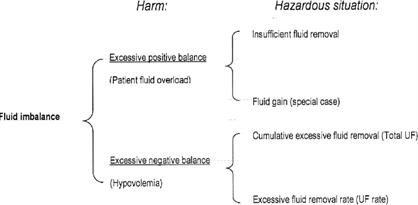A dialysis unit nurse caring for a client with renal failure will expect the client to exhibit which fluid imbalance?
homeostasis
fluid volume excess
Low fluid volume
fluid volume deficit
The Correct Answer is B
Renal failure can cause a buildup of fluid in the body. When kidneys lose their filtering ability, dangerous levels of wastes may accumulate, and your blood’s chemical makeup may get out of balance. This can lead to fluid retention, causing swelling in your legs, ankles or feet.

Nursing Test Bank
Naxlex Comprehensive Predictor Exams
Related Questions
Correct Answer is A
Explanation
Difficulty breathing is a sign of a potential transfusion reaction. When a client reports difficulty breathing during a blood transfusion, the nurse should stop the transfusion immediately to prevent the reaction from worsening. Once the transfusion is stopped, the nurse can then assess the client's vital signs and notify the healthcare provider of the client's response. Documentation of the findings should also be completed after the client's condition has stabilized. However, stopping the transfusion takes priority over documenting the findings.

Correct Answer is A
Explanation
The colon is responsible for absorbing water and nutrients.
I am now at high risk for fluid and electrolyte imbalances. This statement demonstrates that the patient understands the function of the gastrointestinal tract in relation to fluid and electrolyte balance. The colon plays an important role in absorbing water and electrolytes from digested food, and after a large portion of the colon has been removed, the patient may be at higher risk for fluid and electrolyte imbalances.
Received message. The correct option is a. The colon is responsible for absorbing water and nutrients. I am now at high risk for fluid and electrolyte imbalances. This statement demonstrates that the patient understands the function of the gastrointestinal tract in relation to fluid and electrolyte balance. The colon plays an important role in absorbing water and electrolytes from digested food, and after a large portion of the colon has been removed, the patient may be at higher risk for fluid and electrolyte imbalances.

Whether you are a student looking to ace your exams or a practicing nurse seeking to enhance your expertise , our nursing education contents will empower you with the confidence and competence to make a difference in the lives of patients and become a respected leader in the healthcare field.
Visit Naxlex, invest in your future and unlock endless possibilities with our unparalleled nursing education contents today
Report Wrong Answer on the Current Question
Do you disagree with the answer? If yes, what is your expected answer? Explain.
Kindly be descriptive with the issue you are facing.
